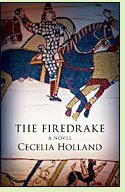The Firedrake
by Cecelia Holland
Reviewed by David Maclaine

In her introduction to The Firedrake, author Cecelia Holland writes about the urgent need to resist the illusion of historical inevitability. The people at the great turning points in history did not know how things would turn out, and anyone who grapples with the past must have a firm hold on this truth. That's why I wish it were possible to read this fine novel in utter, blissful ignorance. It is, from start to finish, the story of a particular man, an Irishman trying to make his way as a mercenary far from home. Fleeing a patron who abused his trust, he journeys across an unfamiliar landscape toward the court of a ruler who may offer a more secure job. Amid his struggle to survive he buys a woman from a man who is beating her; in time she becomes a key part of his life, though much of that unfolds away from her, in the field where he serves in the campaigns of his new Flemish master's son-in-law, Duke William of Normandy.
Our wayward knight proves an astute commander and a fierce warrior, earning the Duke's respect. If we cannot share the characters' astonishment when a fiery-tailed marvel appears in the sky, we do share our hero's ignorance up to a point, as through domestic misfortune and the appearance of a new enterprise he ponders his future. Will he fulfill his daydream of returning to Ireland to regale his relatives with tales of his adventures, or will his foreboding that he will die in the upcoming battle prove true? What we do know is the outcome of that battle, as the armies converge on a hillside near the town of Hastings. Despite this inevitable spoiler effect The Firedrake brings us as close as we can to sharing how it felt to stand where both an individual's life and the fate of a nation were poised on a knife-edge, the outcome hanging on a final charge. (1966, 243 pages)
More about The Firedrake at Amazon.comOther novels about the Norman Conquest and Battle of Hastings:
The Fourteenth of October by Bryher (1952), about a Saxon boy in his teens who witnesses the Battle of Hastings. See review or more info at Amazon.com
The Wind From Hastings by Morgan Llywelyn (1978), about Edyth, wife of King Harold of England and witness to his defeat at Hastings. More info
The Last English King by Julian Rathbone (1997), about a survivor of the Battle of Hastings who travels with a monk and tells him about the events that led to the battle. More info
Nonfiction about the Battle of Hastings:
The Norman Conquest: The Battle of Hastings and the Fall of Anglo-Saxon England by Marc Morris (2013). More info
The Battle of Hastings: The Fall of Anglo-Saxon England by Harriet Harvey Wood (2008). More info
The Battle of Hastings by Jim Bradbury (1997). More info
Online:
The Battle of Hastings Game at the BBC History website, a short animated game recreating the options available to William and Harold.
Back to Novels of the Norman Conquest
Back to Directory of Book Reviews